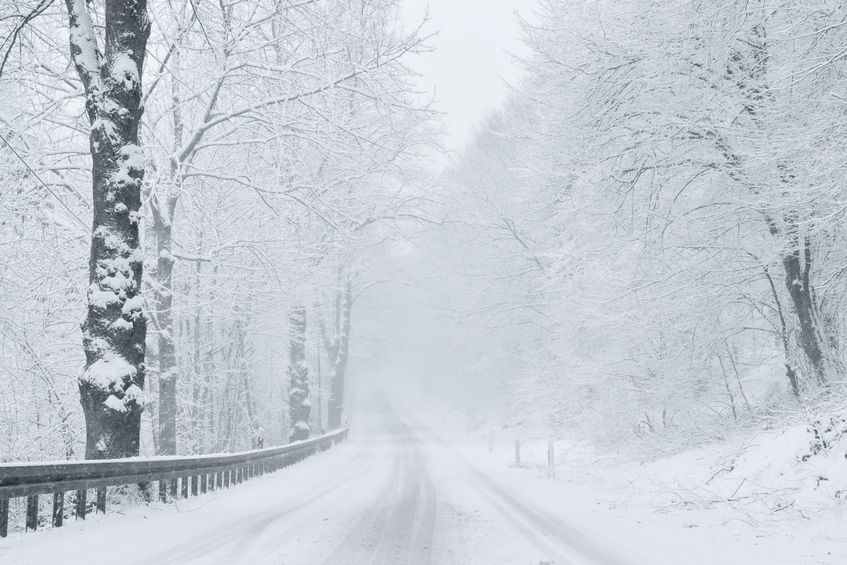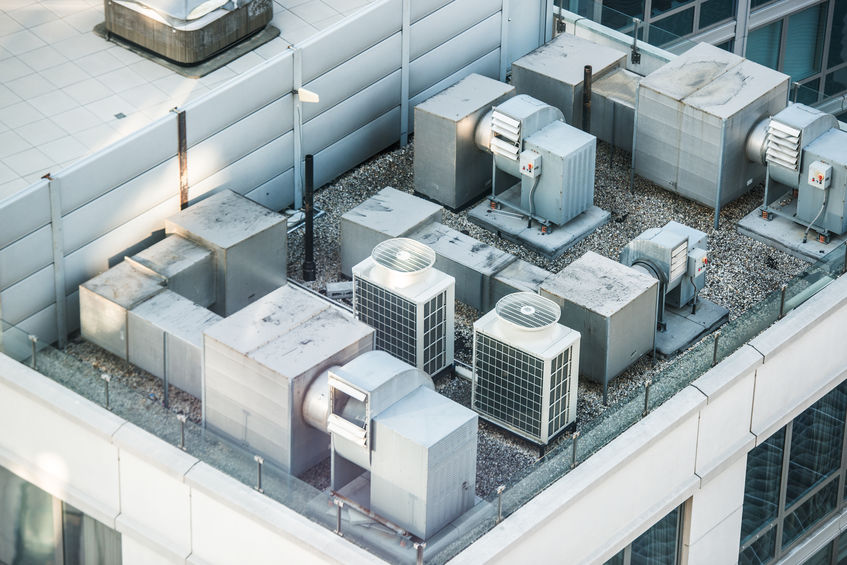Winter can be a brutal time of year, not just on ourselves as we fight the cold weather while running errands, shopping, walking our dogs or doing just about anything outside, but it can also be a huge strain on our HVAC systems. Commercial and Industrial HVAC systems tend to run around the clock so the strain can equate to a greater loss as it can interrupt your business’ ability to operate. In the industrial environment, the process of heating and cooling is utilized in various types of manufacturing including washing, cooking, sterilizing, drying, preheating of boiler feed water, process heating, and much more.

Businesses also need the comfort side of heating and cooling when it comes to generating the optimal temperature for their employees, customers, and vendors, to ensure a safe and productive workspace. The same can be said for schools, hospitals, health care facilities, nursing homes, universities, and prisons, where you are required to ensure a comfortable and consistent temperature, as well as a safe environment.
What would happen if in the midst of the winter season, your equipment fails or needs extensive repair? It can often take four to six weeks to receive special parts or equipment replacements if needed. In the case there is no redundant or backup systems, it could mean a huge loss of time, resources, money as well as business revenue. All of this can be avoided if your business has a consistent preventative maintenance schedule, because most of the issues that can cause a temporary or total breakdown can be predetermined by our team of certified and experienced technicians. If you have not already had your Winter PM completed, now is the time to schedule it.
There are some key elements of your commercial HVAC system, that if checked regularly can prevent a costly breakdown or replacement. While our PM checklist of items is too long to list here, we’ve gathered a list of the items that can be most vulnerable to the freezing temperatures and that can be the most expensive to address if there was an issue.
Our Winter PM Checklist
 ONE. Implement Freeze Protection in Commercial Chillers. Ice, snow and freezing temperatures can wreak havoc on commercial HVAC mechanical parts, including chillers, as they can result in cracked seals, cracked pipes, frozen and blocked pipes, leaks and total failure of the system. Our team will prepare your system for the winter by draining barrels and isolating them to ensure that the ambient temperature (or outdoor temperature) does not allow water in the barrel to freeze. Since frozen water expands, the result would be a catastrophic failure of the system, and could require equipment replacement.
ONE. Implement Freeze Protection in Commercial Chillers. Ice, snow and freezing temperatures can wreak havoc on commercial HVAC mechanical parts, including chillers, as they can result in cracked seals, cracked pipes, frozen and blocked pipes, leaks and total failure of the system. Our team will prepare your system for the winter by draining barrels and isolating them to ensure that the ambient temperature (or outdoor temperature) does not allow water in the barrel to freeze. Since frozen water expands, the result would be a catastrophic failure of the system, and could require equipment replacement.
TWO. Check that all burners on process boilers are functional. A misfunctioning burner, such as with a cracked heat exchanger could cause a leak of carbon dioxide into the building, so this inspection can be lifesaving as well as cost-saving. When our team conducts a PM on your burners, they will check combustion, linkages, and ignition, as well as check safety settings to confirm proper operation, remove and clean burners, check the flues for proper ventilation, check water pressure gauge, expansion tanks and boiler tubes.
THREE. Inspect and Dissect Roof-top Units. Regularly schedule PMs on your rooftop units are particularly important as they are uniquely exposed to the weather (cold, wind, rain, ice, snow, etc.), and due to their remote location, signals of impending failure are harder to see or hear. Our Winter PMs include: check coolant levels, air filters, fans, housing and motor, heat exchangers, drainage, as well as the functionality of the damper.
FOUR. Ensure functionality of Dampers. A typical “mixed-air” air handler includes dampers for outdoor air, return air, and relief air. To provide process cooling, it makes good energy-sense to “economize” by bringing the cooler air inside rather than use resources of the cooling systems. That is where dampers come into play, by controlling the amount of outside air required to provide airside economizing. Usually, an air handler with economizer controls has four operating modes: heating mode, modulated economizer mode, integrated economizer mode, and mechanical cooling mode. Our PM will ensure that the damper is able to successfully open and close based on the controls.
Dampers are vital to the heating and cooling process as it can determine how much heated and cooled air is required to lower or raise the temperature and redistribute the airflow to the required zone or equipment needed to sustain the optimal temperature. If the damper is iced shut or not working properly it can cause your system to be overworked as it tries to reach the desired temperature. This can result in a substantial decrease of energy efficiency and potentially cause a breakdown. Our damper PM will include observing damper motors and actuators, linkages from actuators, inspection of the blades to ensure they close tightly, check blade edges and seals, and lubricate all moving parts.
FIVE. Inspect the Makeup Air Unit. Make-up air unit is designed to “make up” the air in building that has been removed due to process exhaust fans. The Makeup Air Unit (MAU) pulls in fresh, tempered air from outside to replace existing air that cannot be recirculated inside. A MAU facilitates ventilation to improve the Indoor Air Quality (IAQ) to help protect the health of those inside by removing contaminants in the air and providing a comfortable temperature. This has become even more essential and valued during the Covid pandemic, as frequent air exchanges with proper ventilation induced by the Makeup Air Unit can help reduce spread of viruses.
As the winter brings freezing temperatures, a PM of your Make-up Air Unit is highly recommended because once the outside air drops below 35°, the system’s controls should initiate shutoff to prevent catastrophic failure of the system. Our team will ensure proper ventilation, inspect exhaust fans, supply fans, belts, motor, bearings, coils, gas line and burner.
SIX. Prepare your Dual Fuel Boiler for Winter. A Dual Fuel boiler, as per the name, uses two types of fuel to heat or cool air for your commercial comfort or industrial process to maximize efficiency. For example, in a system that uses natural gas as the primary source with a backup of fuel oil, may need to be manually adjusted when the system is working overtime to heat your space when the temperatures drop. To provide cost-savings by reducing utility bills, the business may determine to switch from one fuel source to another, and hence limit the usage of natural gas in that scenario. Our PMs on a dual fuel boiler will be very similar to our traditional boiler PMs, with the exception of ensuring that the manual or remote switch between fuel sources is functioning properly.
Preparing for our Kentucky Schools to Reopen in 2021
 Comfort and Process Solutions is proud to offer our services to many of the school districts in the Commonwealth to ensure comfortable temperatures, cleaner air and improved Indoor Air Quality. We have recently worked with several Kentucky school districts to upgrade, install or modify their commercial HVAC systems to increase air exchanges, improved ventilation, as well as install UV lights, and air scrubbers. The pandemic has opened our eyes to the value of virus prevention now and in the future with a mission of creating a safer and cleaner environment for our students to learn, grow and breathe well. Call us if you’d like to learn more about improving your business, school or facility’s air quality.
Comfort and Process Solutions is proud to offer our services to many of the school districts in the Commonwealth to ensure comfortable temperatures, cleaner air and improved Indoor Air Quality. We have recently worked with several Kentucky school districts to upgrade, install or modify their commercial HVAC systems to increase air exchanges, improved ventilation, as well as install UV lights, and air scrubbers. The pandemic has opened our eyes to the value of virus prevention now and in the future with a mission of creating a safer and cleaner environment for our students to learn, grow and breathe well. Call us if you’d like to learn more about improving your business, school or facility’s air quality.







